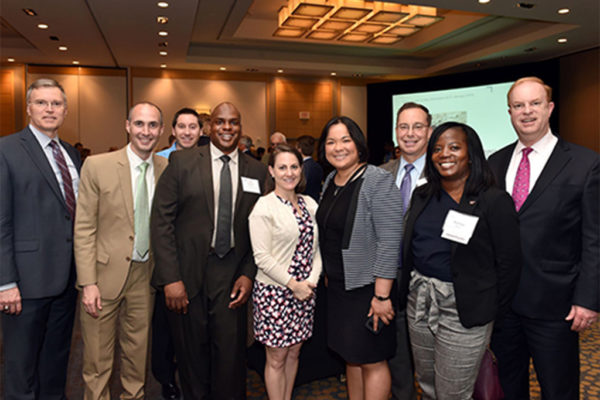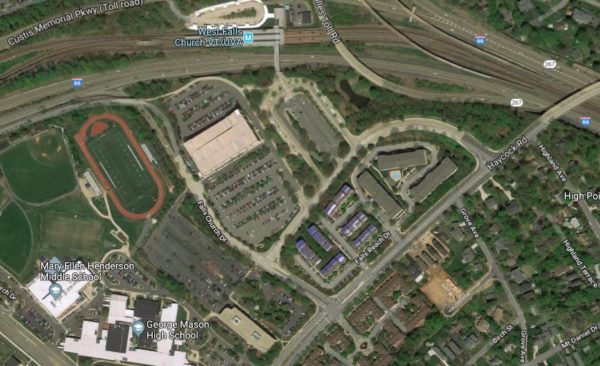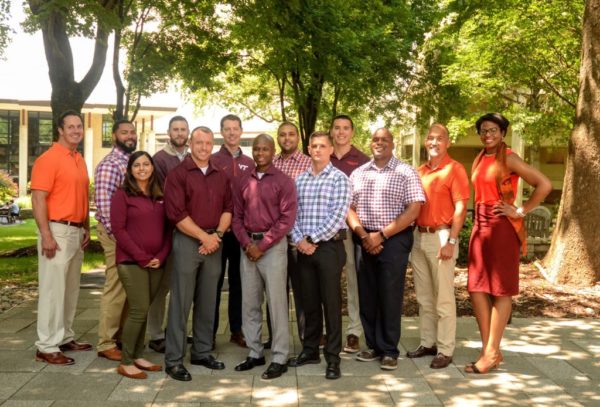Virginia Tech has been making local headlines lately with the announcement of its Innovation Campus in the newly-designated neighborhood of National Landing.
While the new campus will help cement the university’s regional footprint, Virginia Tech has been quietly providing graduate education opportunities in the D.C. area since 1969.
Virginia Tech’s Pamplin College of Business has offered its MBA programs in this region for decades and more recently made the decision to narrow its focus to working professionals in urban centers across the commonwealth.
“What we did at Virginia Tech a few years ago was to say that we really want to focus on the working professional — someone who wants to enhance their career or make a change in the direction of their career, but not at the expense of continuing to be a business professional,” says Pamplin Dean Robert Sumichrast. That allows those students to come into the classroom, he adds, “and use what they’ve learned as part of the experience of the MBA program.”
Falls Church is home to the nationally-ranked Evening MBA program, which is designed to provide maximum flexibility. Students can change their course load each semester to balance work and other commitments. They also have the option to focus their degree in one of 10 specialization areas, including traditional business topics like finance and management, and some more niche areas like healthcare information technology.
The Executive MBA program is an 18-month, cohort-based option with bi-monthly classes in Arlington. The curriculum is designed for mid-career professionals, with an emphasis on experiential learning modules that provide students with hands-on experience in topics like business analytics and leadership and governance.
The Professional MBA program is a 24-month hybrid option with once-per-month in-person classes that rotate between Richmond, Roanoke and Newport News.
Visit mba.vt.edu to learn more about Virginia Tech’s MBA programs, or register to attend an upcoming information session.
With a new commercial center in the works next door, Virginia Tech is ramping up its plans to expand its Falls Church campus.
The Virginia Tech campus is just south of the West Falls Church Metro station, an area with extensive redevelopment in the pipeline for the next few years.
The new facility will mix academic uses, commercial uses, and some residential facilities, according to the Washington Business Journal.
The project will expand the existing academic program and a new national center for smart design and construction. A new mixed residential and commercial complex is also part of the school’s designs for the area. The project would also relocate Hitt Contracting Inc. to a new on-site headquarters.
During a meeting with faculty and staff members, school officials said the programs for the expanded campus are still being developed with the goal of finding a distinct focus for the campus apart from the Virginia Tech locations in Arlington and Alexandria.
Photo via Google Maps
The working professionals who pursue the Arlington-based Executive MBA at Virginia Tech get a rich education in the fundamentals of business — accounting and finance, marketing, operations, ethics, communications and leadership.
But woven around those foundation courses are “experiential modules” designed to accelerate development in four essential and current areas:
- Business analytics
- Entrepreneurship & innovation
- Leadership & governance
- Global business
Each module includes two concentration classes plus a “big experience” course that puts the learning to work immediately, says Barbara Hoopes, academic director for Virginia Tech MBA Programs.
Corporate leaders are brought in “to provide guidance and bring real-life projects to students,” adds Parviz Ghandforoush, associate dean for graduate programs in the Pamplin College of Business.
What does this look like on the ground? For the analytics module, which covers BI and data mining along with marketing analytics, Hoopes brought in four software vendors — Microsoft, Qlik, SAS and Tableau — to provide access to their products and act as coaches.
Students addressed pressing issues with U.S. infrastructure using publicly available data to analyze Congressional airport funding and its relationship to economic growth, identify causal factors for large utility outages and predict hazard classifications of dams in order to prioritize inspections.
Hoopes asserts that students really “need to understand how data can be used to support their decision-making.” That means “learning how to tell a story that convinces others” — in other words, traversing that last mile between the data scientist and the people at the very top.
Ghandforoush notes that students often arrive with an expectation that the data work they will do during their MBA is a throw-away “because they don’t need it or they have analysts at work who will do this for them.” And yet faculty hear back from former skeptics that those lessons turned out to be the most valuable in the program “because they’re actually using it at work and they’ve seen the results.”
That’s just what Virginia Tech had in mind when it undertook its redesign of the MBA for working professionals. “It’s not like students graduate and four or five years later we will hear if they have benefited from their MBA,” he concludes. “This is like a laboratory. We get to watch this as it’s happening right before our eyes.”
Virginia Tech’s Evening MBA program moved up three places to No. 14 in U.S. News & World Report’s 2019 rankings of the best part-time MBA programs.
The Northern Virginia-based program now ranks as the top public university part-time MBA in the Washington, D.C. metro area. The report assessed more than 300 part-time MBA programs across the country on factors such as student quality, peer reputation and the ratio of part-time to full-time students.
“This marks the fifth consecutive year that the Evening MBA has featured in the top 20 programs nationwide,” said Dana K. Hansson, director of MBA programs. “We believe the faculty expertise and high level of flexibility we offer are key factors in continuing to attract high quality students to our program.”
The Evening MBA is one of three MBA programs offered by the Pamplin College of Business. With many shared courses and faculty, the Executive and Professional MBA program options offer a similar academic experience to the Evening program, but with alternate formats and locations to better serve a range of students.
“What we did at Virginia Tech a few years ago was to say that we really want to focus on the working professional — someone who wants to enhance their career or make a change in the direction of their career, but not at the expense of continuing to be a business professional,” says Pamplin Dean Robert Sumichrast. That allows those students to come into the classroom, he adds, “and use what they’ve learned as part of the experience of the MBA program.”
This commitment to serving part-time students contributed to Virginia Tech’s highest ever overall score in the ranking. Another contributing factor was a strong appraisal by other programs.
“We’re particularly proud of the peer assessment score given the high quality of other programs in the nation,” said Dr. Parviz Ghandforoush, associate dean for graduate programs at Pamplin. “In part, we believe the high rating is due to our commitment to offering cutting-edge courses in areas like innovation and entrepreneurship, machine learning/AI and cybersecurity that aren’t available to students in more traditional MBA programs.”





